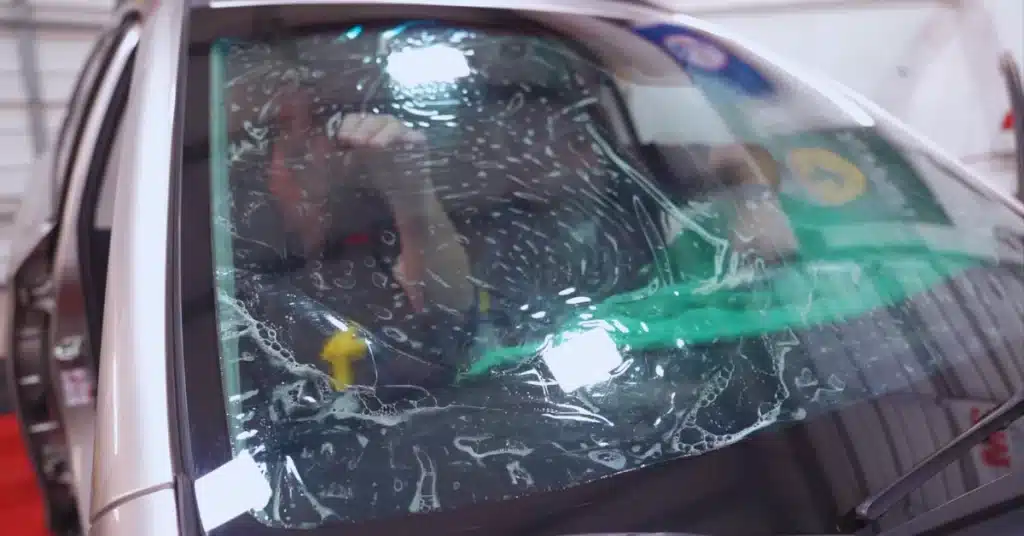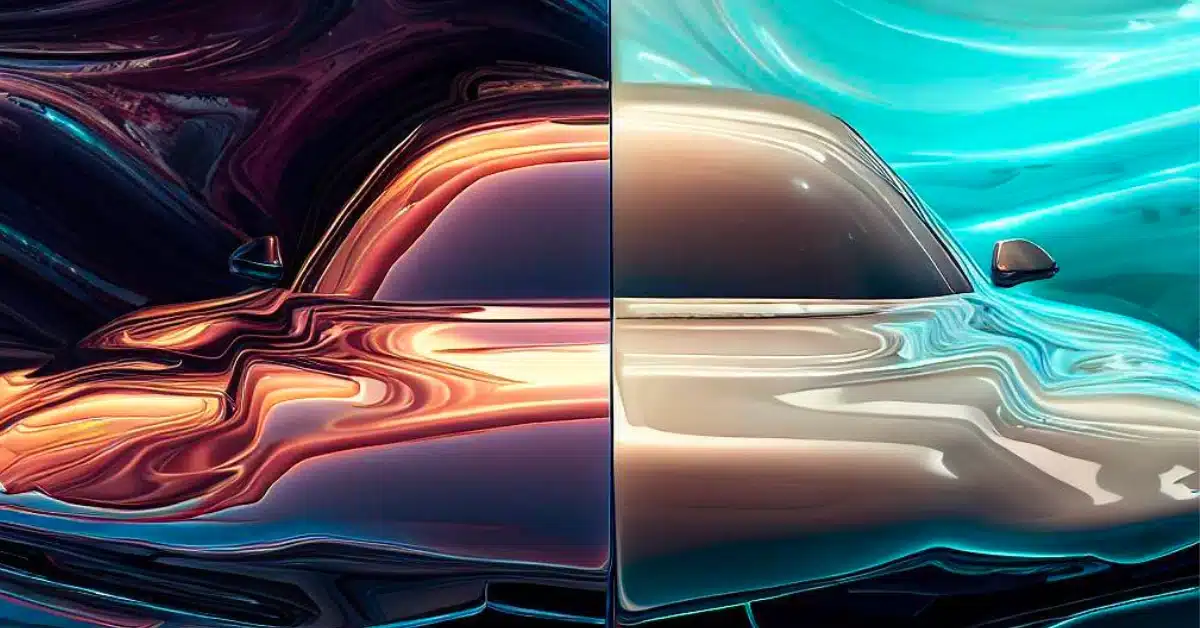In the world of automotive window films, two popular options that often come up in discussions are 3M Ceramic IR vs. Crystalline films.
These films are designed to enhance the appearance of your vehicle, provide privacy, reduce heat and glare, and offer protection against harmful UV rays.
However, they differ in their composition and performance characteristics.
In this article, I will explore the features and benefits of 3M Ceramic IR and Crystalline films to help you determine which one is the best fit for your needs.
Read More: 3M Crystalline 90 vs. 70
What is 3M Ceramic IR Film?
3M Ceramic IR film is a technologically advanced window film that combines the benefits of ceramic particles and infrared (IR) blocking technology.
The film’s ceramic particles help block out a significant amount of heat from the sun, keeping the interior of your vehicle cooler and more comfortable.
Additionally, the film also provides excellent protection against harmful UV rays, which can cause fading and damage to your vehicle’s interior.

What is 3M Crystalline Film?
On the other hand, Crystalline film from 3M is known for its superior clarity and light transmission properties.
It is made using a unique multilayer optical film technology that allows it to reject a high percentage of heat while maintaining a virtually clear appearance.
Crystalline film is designed to provide exceptional heat and glare reduction while also offering protection against UV rays.
3M Ceramic IR vs. Crystalline
| Feature | 3M Ceramic IR | 3M Crystalline |
|---|---|---|
| Infrared Heat Rejection | Very High | Extremely High |
| Visible Light Transmission | Comes in different grades (e.g., 30%, 40%) | Comes in different grades (e.g., 40%, 70%, 90%) |
| Glare Reduction | Significant | Significant |
| UV Protection | 99.9% | 99.9% |
| Signal Interference | None | None |
| Material | Nano-ceramic technology | Multi-layer optical film technology |
| Color | Available in multiple shades including color-stable | Generally less tinted, almost clear |
| Durability | High | Very High |
| Warranty | Yes (length varies) | Yes (length varies) |
Heat Rejection Performance
Both 3M Ceramic IR and Crystalline films are highly effective regarding heat rejection.
However, the Ceramic IR film has a slight edge over Crystalline regarding its ability to block out heat.
The Ceramic IR film can reject up to 95% of infrared heat, whereas Crystalline film typically blocks around 60-70% of infrared heat.
This means that Ceramic IR film can provide a more significant reduction in interior heat and help keep your vehicle cooler on hot days.

Visible Light Transmission and Clarity
Clarity and visible light transmission are crucial factors to consider when choosing a window film.
The crystalline film stands out in this aspect, as it offers exceptional clarity and high visible light transmission.
With Crystalline film, you can enjoy the benefits of heat and glare reduction without compromising the aesthetics of your vehicle.
On the other hand, 3M Ceramic IR film also provides good clarity but may have a slightly lower visible light transmission compared to Crystalline film.
UV Protection
Both 3M Ceramic IR and Crystalline films provide excellent protection against harmful UV rays. UV rays can cause damage to your vehicle’s interior, such as fading of upholstery and dashboard components.
Ceramic IR film and Crystalline film can block up to 99% of UV rays, offering reliable protection for you and your vehicle’s interior.
Price and Affordability
Price is an important consideration for many when selecting a window film. Generally, Crystalline film tends to be more expensive than Ceramic IR film.
The advanced multilayer technology and superior performance characteristics of Crystalline film contribute to its higher price point.
On the other hand, Ceramic IR film offers excellent heat and UV protection at a relatively more affordable price.
It provides a balance between performance and cost, making it a popular choice for many vehicle owners.
Installation and Warranty
Both 3M Ceramic IR and Crystalline films are professionally installed by authorized dealers. The installation process involves applying the film to the interior surface of your vehicle’s windows.
When installed correctly, the films provide a seamless appearance and long-lasting performance.
Additionally, both films come with a warranty provided by 3M, which offers peace of mind and quality assurance.
What is the difference between ceramic and crystalline tint?
Ceramic tint and crystalline tint are both types of window films used for tinting windows, but they differ in composition and performance characteristics.
Ceramic tint is made from a non-metallic, ceramic-based material that is layered onto the window glass. It uses advanced nanotechnology to block heat and UV rays. Ceramic tints are known for their high visible light transmission (VLT), which means they allow more light to pass through compared to other types of window films.
Despite this, ceramic tints are effective at blocking infrared (IR) radiation, which helps to reduce heat buildup inside the vehicle or building. They also provide good glare reduction and UV protection.
Ceramic tints are generally more expensive than other types of tint films but offer excellent heat rejection without interfering with radio or GPS signals.
Crystalline tint is a specialized window film manufactured by 3M. It is composed of multiple layers of optical film that contain a proprietary blend of inorganic materials.
The unique construction of crystalline tint allows it to provide exceptional heat rejection while maintaining a high level of visible light transmission. It can block up to 97% of infrared heat-producing wavelengths, allowing most visible light to pass through.
This makes it an excellent choice for those who want a nearly clear window appearance with excellent heat rejection capabilities. Crystalline tint also provides UV protection and reduces glare. It is trendy because it blocks heat without significantly darkening the windows.
Why is 3M crystalline the best tint?
3M Crystalline tint is considered by many to be a top-quality tint film. It offers several advantages that contribute to its popularity:
Superior Heat Rejection: Crystalline tint has excellent heat-blocking properties, helping to keep the interior of a vehicle or building cool and comfortable.
High Visible Light Transmission (VLT): It allows significant natural light to pass through, maintaining visibility and brightness inside.
Low Reflectivity: Crystalline tint has minimal mirror-like effects, preserving the original appearance of the glass.
UV Protection: It provides high protection against harmful UV rays, reducing the risk of skin damage and interior fading.
Compatibility with Electronics: Crystalline tint minimally interferes with electronic devices, allowing signals to pass through without disruption.
How dark is 3M crystalline?
3M Crystalline tint is available in various shades, ranging from nearly clear to darker options. The darkness level is determined by the Visible Light Transmission (VLT) percentage, which can vary from around 40% to 90%.
The specific darkness can be chosen based on personal preference and local regulations.
It’s advisable to consult a professional tint installer to determine the most suitable darkness level for your needs and comply with applicable regulations.
Final Opinion
After comparing the features and benefits of 3M Ceramic IR and Crystalline films, it is clear that both options have their strengths.
If you prioritize heat rejection and affordability, 3M Ceramic IR film is an excellent choice. It offers superior heat reduction capabilities and reliable UV protection, all at a reasonable price point.
On the other hand, if you value exceptional clarity, high visible light transmission, and are willing to invest in a premium window film, Crystalline film is the way to go.
Crystalline film provides excellent heat and glare reduction while maintaining a nearly invisible appearance.
Ultimately, the decision between 3M Ceramic IR and Crystalline films depends on your specific needs, preferences, and budget.
Whether you choose the Ceramic IR or Crystalline film, you can rest assured knowing that 3M’s reputation backs both options for quality and performance.
Enhance your vehicle’s comfort, style, and protection with a reliable and trusted window film choice.
Remember, when selecting a window film, it’s essential to consult with a professional installer who can provide personalized recommendations based on your vehicle’s requirements and your desired outcome.





